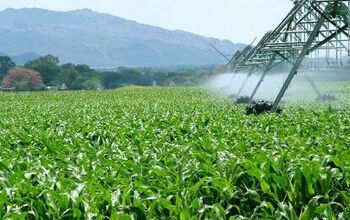E85 Boondoggle of the Day: 2100 Gallons of Water Per Gallon of E85?

Corn-based ethanol took another blow from the scientific literature this week. University of Minnesota scientists published an article revealing that corn into E85 could require three times as much water as previously estimated. The bottom line: it takes more than 2,100 gallons of water to produce a single gallon of ethanol. That’s bad news for corn-etoh’s partisans; water supplies in the US are not exactly ample (as the NYT Mag pointed out a couple of years ago in its article, “ The Future Is Drying Up“). Ethanol has also been bashed for competing with food, and for raising carbon emissions over a period of decades, rather than reducing them. The researchers, led by Sangwon Suh, note that the water needs vary widely depending on irrigation practices. In a dozen Corn Belt states, production of a gallon of E85 requires less than 100 gallons of water. I still wouldn’t buy any stock . . .
Thus, the plant needs to ingest huge quantities of air vial the leaves, but the extensive surfaces for absorbing the air lose water fast. Thus, about 500 water molecules must cycle through the plant for every carbon dioxide molecule the plant captures. “If I turned the mass of my body into sunflower leaves, I’d have to drink two liters every 30 seconds,” says Holbrook.
Holbrook recently added a 7th task to her list of impossible tasks of plants: sustainably producing liquid fuels from crops. There’ll be no joy in Mudville over this one . . .

I'm a freelance journalist covering science, medicine, and automobiles.
More by David C. Holzman
Latest Car Reviews
Read moreLatest Product Reviews
Read moreRecent Comments
- Redapple2 I retract my comments and apologize.
- Flashindapan I always thought these look nice. I was working at a Land Rover dealership at the time the LR3 came out and we were all impressed how much better it was then the Discovery in just about every measurable way.
- Bd2 If I were going to spend $ on a ticking time bomb, it wouldn't be for an LR4 (the least interesting of Land Rovers).
- Spectator Wild to me the US sent like $100B overseas for other peoples wars while we clammer over .1% of that money being used to promote EVs in our country.
- Spectator got a pic of that 27 inch screen? That sounds massive!


































Comments
Join the conversation
Sugar cane is a much more productive crop for ethanol than corn, but if you believe global heating is a problem--and I know many ttac readers don't, but please lets not get into another argument about THAT--the US tariff is preventing a lot of carbon emissions that would happen if the brazilians increased production of sugar cane. To understand that, you can click on the link I provided in the blog about the carbon impact of biofuels. But ohsnapback is absolutely right about the reason for the tariff. Twotone may well be right about algae farms. The carbon impact link covers that as well. (I wrote it.)
David Holzman - Thanks for that link; interesting stuff.